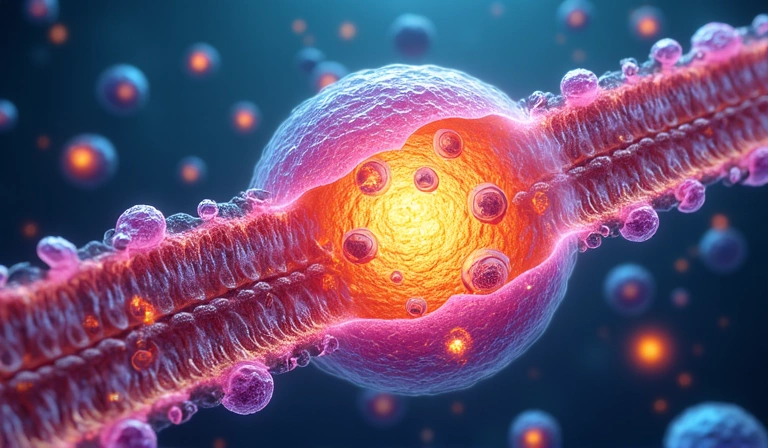Understanding Energy Depletion and Nutritional Solutions
In today's fast-paced world, millions of people struggle with persistent fatigue and low energy levels. Whether you're juggling work responsibilities, maintaining an active lifestyle, or simply trying to keep up with daily demands, energy depletion has become a widespread concern affecting productivity, mood, and overall quality of life. The root causes of this energy crisis are multifaceted, ranging from inadequate nutrition and poor sleep quality to chronic stress and sedentary habits.
Natural vitamins for energy represent a scientifically-supported approach to revitalizing your body from within. Unlike synthetic energy drinks or caffeine-dependent solutions that provide temporary spikes followed by crashes, a comprehensive complex for energy and endurance works synergistically with your body's natural metabolic processes. These vitamins address the fundamental nutritional gaps that contribute to fatigue, ensuring your cells have the essential micronutrients needed for optimal ATP (adenosine triphosphate) production—the actual energy currency of your body.
The human body requires specific vitamins and minerals to convert food into usable energy. When these nutrients are deficient, even if you're eating enough calories, your energy levels suffer. This is why many people report feeling constantly tired despite sleeping eight hours or eating regular meals. The solution lies in understanding which vitamins are crucial for energy metabolism and how to incorporate them effectively into your daily routine.
Essential B Vitamins: The Energy Powerhouses
The B-complex vitamins are perhaps the most critical group for energy production and are fundamental components of any effective vitamins for men and women seeking sustained vitality. These eight essential nutrients work together as a coordinated system to extract energy from carbohydrates, proteins, and fats you consume, making them absolutely indispensable for anyone looking to maintain consistent energy levels throughout the day.
Vitamin B1 (Thiamine)
Essential for converting glucose into energy, Vitamin B1 plays a crucial role in nerve function and muscle development. A deficiency can lead to fatigue, weakness, and impaired cognitive function. This vitamin is particularly important for individuals with high physical activity levels or those consuming refined carbohydrates regularly.
Sources: Whole grains, pork, legumes, seeds, nuts
Vitamin B2 (Riboflavin)
Riboflavin is vital for energy metabolism and acts as a powerful antioxidant protecting your cells from oxidative stress. It supports the function of other B vitamins and is essential for maintaining healthy skin, eyes, and nervous system function. Many energy-related issues stem from B2 deficiency.
Sources: Eggs, almonds, mushrooms, chicken, dairy products
Vitamin B3 (Niacin)
Niacin is crucial for DNA repair, cell metabolism, and energy production. It helps convert food into ATP, your body's primary energy molecule. B3 also supports cardiovascular health and can improve blood circulation, ensuring oxygen and nutrients reach your muscles and brain efficiently.
Sources: Tuna, chicken breast, turkey, peanuts, mushrooms
Vitamin B5 (Pantothenic Acid)
Known as the "anti-stress" vitamin, B5 is essential for hormone production and energy metabolism. It helps your body manage stress more effectively and supports adrenal function, which directly impacts your energy levels and resilience during demanding periods.
Sources: Avocados, eggs, mushrooms, chicken, sunflower seeds
Vitamin B6, B7, B9, and B12: The Energy Multipliers
Beyond the foundational B vitamins, B6 supports amino acid metabolism and neurotransmitter production, directly influencing mood and energy. B7 promotes healthy metabolism and energy utilization. B9 (folate) is essential for cell division and DNA synthesis, supporting sustained energy production. B12 is perhaps the most famous energy vitamin, critical for red blood cell formation and neurological function.
Together, these B vitamins form a comprehensive complex for energy and endurance that addresses multiple pathways in your body's energy production system. A deficiency in any single B vitamin can compromise the entire system, which is why taking a complete B-complex supplement is often more effective than targeting individual vitamins.

Iron and Magnesium: The Oxygen and Relaxation Connection
While vitamins receive much of the attention in discussions about energy, minerals play equally crucial roles in sustaining vitality. Iron and magnesium are two minerals that directly impact your energy levels and are often deficient in modern diets, particularly affecting vitamins for men and women with specific dietary restrictions or high physical demands.
Iron: The Oxygen Transporter
Iron is essential for hemoglobin production, the protein in red blood cells responsible for carrying oxygen throughout your body. Without adequate iron, your cells cannot receive the oxygen they need for energy production, resulting in fatigue, weakness, and reduced physical performance. This is particularly important for athletes, women of reproductive age, and vegetarians who may struggle to meet their iron needs through diet alone.
Iron deficiency anemia is one of the most common nutritional deficiencies worldwide, affecting millions of people who don't realize their persistent fatigue is directly related to inadequate iron intake. The symptoms often mimic other conditions, leading to misdiagnosis and continued suffering. A simple blood test can determine your iron levels, and supplementation can dramatically improve your energy within weeks.
Magnesium: The Energy Relaxation Paradox
Magnesium is involved in over 300 enzymatic reactions in your body, many of which are directly related to energy production. Paradoxically, while magnesium is essential for creating energy, it also promotes relaxation and better sleep—two factors that significantly impact daytime energy levels. This mineral helps regulate your nervous system, reduces stress-induced cortisol production, and supports healthy sleep cycles, all of which contribute to sustained energy.
Modern diets are increasingly deficient in magnesium due to soil depletion and processing of whole foods. Chronic magnesium deficiency manifests as fatigue, muscle weakness, poor sleep quality, and increased stress sensitivity. Supplementing with magnesium can improve both your ability to produce energy and your capacity to recover properly through quality sleep, creating a positive cycle of sustained vitality.

Antioxidants and Coenzyme Q10: Cellular Energy Optimization
Beyond basic vitamins and minerals, advanced nutritional support for energy includes powerful antioxidants and specialized compounds that optimize cellular energy production at the mitochondrial level. These substances are increasingly recognized as essential components of any comprehensive complex for energy and endurance.
1 Coenzyme Q10 (CoQ10)
CoQ10 is a naturally occurring compound found in every cell of your body, with the highest concentrations in organs with the greatest energy demands: your heart, brain, and muscles. This powerful antioxidant is essential for ATP production in mitochondria—the powerhouses of your cells. CoQ10 levels naturally decline with age, which explains why energy decreases as we get older. Supplementing with CoQ10 can restore cellular energy production capacity and improve exercise performance, endurance, and recovery.
2 Vitamin C: The Metabolic Catalyst
Vitamin C is crucial for collagen synthesis, immune function, and iron absorption—all of which impact energy levels. This water-soluble vitamin cannot be stored in your body, requiring daily intake through diet or supplementation. Beyond its immune-boosting reputation, Vitamin C supports energy metabolism by facilitating the absorption of other nutrients and protecting cells from oxidative stress that can impair energy production.
3 Vitamin E and Selenium: Protective Antioxidants
These fat-soluble antioxidants work synergistically to protect your cells from oxidative damage, which can impair energy production and accelerate aging. By reducing oxidative stress, Vitamin E and selenium allow your mitochondria to function more efficiently, directly translating to improved energy levels and better athletic performance.
4 L-Carnitine: The Energy Transporter
This amino acid derivative is responsible for transporting fatty acids into mitochondria where they can be converted to energy. L-carnitine is particularly valuable for individuals pursuing weight loss or athletic performance, as it enhances the body's ability to utilize fat as fuel while preserving muscle mass. Studies show that L-carnitine supplementation can improve endurance, reduce fatigue, and accelerate recovery.

Choosing the Right Vitamin Complex for Your Energy Needs
With countless vitamin supplements on the market, selecting the right complex for energy and endurance can feel overwhelming. Understanding your individual needs and what to look for in a quality supplement is essential for achieving optimal results.
Assessing Your Individual Needs
Before investing in supplements, consider your current energy levels, dietary habits, lifestyle, and any underlying health conditions. Vegetarians and vegans may need additional B12 and iron. Athletes require higher levels of B vitamins and minerals to support increased metabolic demands. Older adults may benefit from enhanced CoQ10 and magnesium. Women may need additional iron, while men may need different proportions of certain nutrients.
Consider consulting with a healthcare provider or registered dietitian who can assess your nutritional status through blood tests and recommend personalized supplementation. This targeted approach is far more effective than taking generic multivitamins that may not address your specific deficiencies.
Quality Indicators for Vitamin Supplements
- ✓ Third-Party Testing: Look for supplements tested by organizations like USP, NSF, or ConsumerLab to verify potency and purity. This ensures the product contains what the label claims without harmful contaminants.
- ✓ Bioavailable Forms: The form of vitamin matters significantly. For example, methylcobalamin is a more bioavailable form of B12 than cyanocobalamin. Chelated minerals are better absorbed than non-chelated forms.
- ✓ Appropriate Dosages: More isn't always better. Look for supplements with dosages that align with established recommended dietary allowances (RDAs) and upper tolerable limits. Excessive supplementation can cause adverse effects.
- ✓
- ✓
Supplement Types and Delivery Methods
Vitamins for men and women come in various forms: tablets, capsules, powders, and liquids. Each has advantages and disadvantages. Tablets are convenient and shelf-stable but may be harder to digest. Capsules dissolve more easily in the stomach. Powders offer flexibility in dosing and often have better absorption but require mixing. Liquid supplements have excellent bioavailability but may have shorter shelf lives.
For optimal energy support, many experts recommend a combination approach: a comprehensive multivitamin as your foundation, supplemented with targeted nutrients based on your specific deficiencies. This might include additional magnesium for sleep and stress support, extra B12 for energy and mood, and CoQ10 for cellular energy optimization.
Integrating Vitamins with Lifestyle for Maximum Energy Impact
Vitamins alone cannot solve energy problems rooted in poor lifestyle choices. The most effective approach combines supplementation with sustainable lifestyle modifications that maximize your body's natural energy production capacity.
Sleep Quality and Duration
Sleep is when your body repairs itself and consolidates energy stores. Magnesium and B vitamins support healthy sleep cycles, but they work best when combined with good sleep hygiene: consistent sleep schedules, dark sleeping environments, and limiting screen time before bed. Aim for 7-9 hours nightly to fully benefit from your vitamin supplementation.
Balanced Nutrition
Supplements enhance nutrition but cannot replace whole foods. A diet rich in whole grains, lean proteins, colorful vegetables, and healthy fats provides the foundation for sustained energy. Vitamins for energy work synergistically with proper macronutrient balance to fuel your body optimally.
Regular Physical Activity
Exercise increases mitochondrial density and energy production capacity. A complex for energy and endurance is most effective when combined with consistent physical activity. Even moderate exercise like brisk walking significantly enhances the benefits of vitamin supplementation.
Stress Management
Chronic stress depletes your body's nutrient stores and impairs energy production. Meditation, yoga, deep breathing, and other stress-reduction techniques amplify the benefits of vitamins for men and women by reducing cortisol and supporting nervous system balance.
Hydration
Even mild dehydration impairs energy production and cognitive function. Proper hydration enhances nutrient absorption and supports all metabolic processes. Aim for adequate water intake throughout the day, adjusted for activity level and climate.
Timing and Consistency
Taking vitamins consistently is crucial. B vitamins are water-soluble and require daily replenishment. Fat-soluble vitamins build up over time. Establish a routine—perhaps taking your complex for energy and endurance with breakfast—to ensure consistent supplementation.

Common Energy Deficiency Patterns and Solutions
Different populations experience energy depletion for different reasons. Understanding your specific pattern can help you select the most appropriate vitamins for your situation.
The Busy Professional
Characterized by: Chronic stress, irregular eating patterns, limited sleep, high caffeine dependence.
Recommended approach: Comprehensive B-complex vitamins for stress support and energy metabolism, magnesium for sleep quality, CoQ10 for cellular energy. Emphasis on consistent supplementation despite busy schedules.
The Athlete or Active Individual
Characterized by: High metabolic demands, increased nutrient depletion through sweat, muscle recovery needs, higher caloric requirements.
Recommended approach: Enhanced B vitamins for energy metabolism, iron for oxygen transport, magnesium for muscle function and recovery, L-carnitine for fat utilization, comprehensive antioxidants to manage exercise-induced oxidative stress.
The Aging Adult
Characterized by: Natural decline in nutrient absorption, reduced metabolic rate, decreased mitochondrial function, age-related energy decline.
Recommended approach: Enhanced CoQ10 for mitochondrial support, comprehensive B vitamins (especially B12 in more bioavailable forms), magnesium for sleep and muscle function, antioxidants including Vitamins C and E, potentially higher iron support for some individuals.
The Vegetarian or Vegan
Characterized by: Potential B12 deficiency (only naturally found in animal products), possible iron deficiency, potentially inadequate complete proteins.
Recommended approach: Supplemental B12 (methylcobalamin preferred), enhanced iron support with Vitamin C for absorption, comprehensive B-complex vitamins, potentially amino acid support for complete protein profile.
The Post-Illness Recovery
Characterized by: Nutrient depletion from illness, weakened immune system, prolonged fatigue, slow recovery.
Recommended approach: Comprehensive multivitamin with enhanced nutrients, particularly B vitamins and Vitamin C for immune support, iron for recovery from potential blood loss or anemia, magnesium for muscle strength restoration, gradual increase in physical activity as energy improves.
Expected Results and Timeline for Energy Improvement
One of the most common questions about vitamins for energy is: "How long before I feel the difference?" The answer depends on your current nutritional status, the severity of deficiencies, and how comprehensively you implement dietary and lifestyle changes alongside supplementation.
